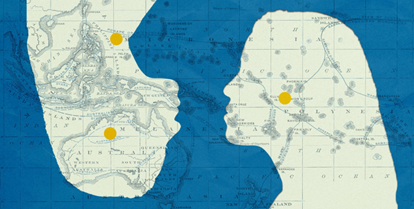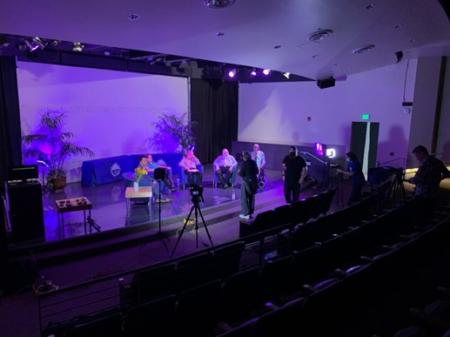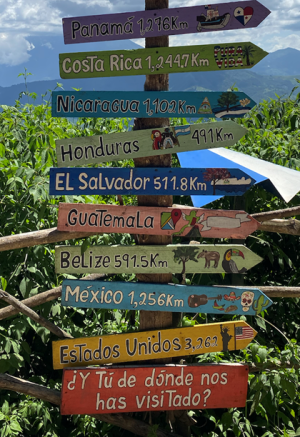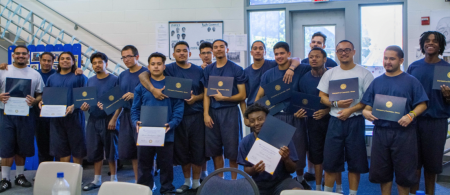The C-LAB Student Research Collaboration Grant aims to cultivate mentored research justice opportunities for undergraduate students. Selected student collaborations bring together graduate and undergraduate students to engage in meaningful research and professional development. This grant is made possible through a generous gift from Suzanne Hanna.
Introducing the 2023-2024 C-LAB Student Research Collaboration Grant Recipients
“Just do the PI: Addressing Pacific Islander Data Equity”
Malia Baricuatro, PhD Student in the Department of Global Studies
Leighani Sablan, Undergraduate Student in the Department of Psychological Science
Dr. Tiara Na’puti, Associate Professor of Global Studies

Decades of calls from NHPI and ally activists have belabored the need to disaggregate NHPI data from broader demographic categories to better illuminate the needs of Pacific indigenous communities. In line with movements for Pasifika data equity in Southern California, we implore an Indigenous World View, which situates indigenous people at the center of indigenous research, to identify the specific needs of local PI communities. We collaborate with community members to build upon an archive of Pacific Islander-serving organizations in Orange County and surrounding areas.
“Navigating Pathways to Adulthood in an Era of Precarity: Latino Young Adults on the Community College Pathway”
José Gutierrez, PhD Candidate in the Department of Sociology
Carlos Alberto Olivares, Undergraduate student in the Department of Chicano/Latino Studies
Cynthia Nuñez, Undergraduate student in the Department of Sociology
Peter Jesus Pantaleon, Undergraduate student in the Department of Sociology
Dr. Laura Enriquez, Associate Professor of Chicano/Latino Studies

The transition to adulthood in the United States is a precarious time when young people strive for stability in a vastly unequal society. Today, many young adults look to higher education to find this stability. However, prevailing research on this transition and its relationship to higher education predominantly focuses on the experiences of white working-class and middle-class young adults enrolled in four-year colleges, leaving a significant gap in our understanding of the unique pathways and challenges faced by racialized minorities. In this study, we turn attention to the understudied group of Latino young adults who look to California Community Colleges to support their pathway to a stable adulthood. Using intersectionality as a guiding framework, we use in-depth interviews to examine how the intersections of race, class, and gender shape the balancing and planning of school, work, marriage, and family among working-class and middle-class Latino young adults who attend community college.
“Familia, Leadership, Pride: Archiving the Logics and Recuerdos of the Inland Empire Future Leaders Program”
Stephanie Vanessa Martinez, PhD Student in the Department of History
Katelin Ramos, Undergraduate student in the Department of History
Dr. Rachel O’Toole, Associate Professor of History

This project will envision, build, and create the means to maintain an activist archive in collaboration with the Inland Empire Future Leaders Program's (IEFLP) fortieth celebration. This project will demonstrate memory activism as the common experience of volunteers in the non-profit organization. Despite IEFLP’s lasting impact and commitment to the Latine community, a quick google search of the organization yields an archival silence. The silence does not result from the program’s reliance on an institutional archive model to represent their history. Instead, their silencing occurs due to an imbalance of power in the production of sources, archives and narratives. Yet, the institutional memory highlights only a few of the program founders while mitigating the impact co-founder Susan Castro has had on the program. As a result, we will create an activist archive that will embrace its previous archival footprint and emphasize founding women and the many women identifying volunteers that have carried on their legacy.
“Local Context, Transnational Space and Legal Realities: Identity Development among Central American Children of Immigrants”
Jenniffer Cecilia Perez Lopez, PhD student in the Department of Sociology
Marisela Granados, Criminology, Law and Society
Andrea Margarita Martinez, Undergraduate student in the Department of Social Ecology
Dr. Laura Enriquez, Associate Professor of Chicano/Latino Studies

Until recently, little research has centered on the lives of the 10 million Central Americans living in the United States (MPI, 2021). Following Central American children of immigrants returning after a long period or visiting Central America for the first time, this project seeks to link personal identifications with laws by mapping the role of legal status and transnational ties within the process of travel. Utilizing healing methodologies, our team uses an autoethnographic approach through writing journal entries, photography, and poetry to unpack our experience of travel to Central America. To understand how identities evolve and/or are amplified by traveling, we situate ourselves as three Central American people of color to analyze how travel shapes our identification before, during, and after travel to Central America. Exploring travel as an identity component that Central Americans grapple with provides insight into a group that straddles U.S. and Latin American dynamics while unpacking their continued integration.
"Underground Scholars at Orange County Juvenile Hall"
Alberto Lule, MFA Candidate Claire Trevor School of the Arts
Alejandro Cabrera Maldanado, Undergraduate Chicano Studies
Professor Rachael Louise Collins, Lecturer, UCI Humanities (LUCID Journal Publication connection)
Professor Liz Glynn, Sculpture, Claire Trevor school of the Arts UCI (Faculty Advisor)

The Underground Scholars Initiative (USI), a student organization that exists within the UC system, rests upon four foundational pillars or primary goals, which are all working together in the organization's motto of “Building a Prison to School Pipeline.” This motto is a reversal of the “School to Prison Pipeline.” The four pillars of USI are Recruitment, Retention, Advocacy, and Self Care. I am researching the implementation of these foundational goals to currently incarcerated youth at the Orange County Juvenile facility. Correctional facilities across California have begun looking for progressive alternatives to the traditional rehabilitation models of the past. The Underground Scholars Initiative at UC Irvine has begun teaching art lessons and writing activities at Orange County Juvenile Hall. Our project will conduct this research combined with research into alternative forms of pedagogy as well as alternative forms of collaboration between graduate and undergraduate students.
